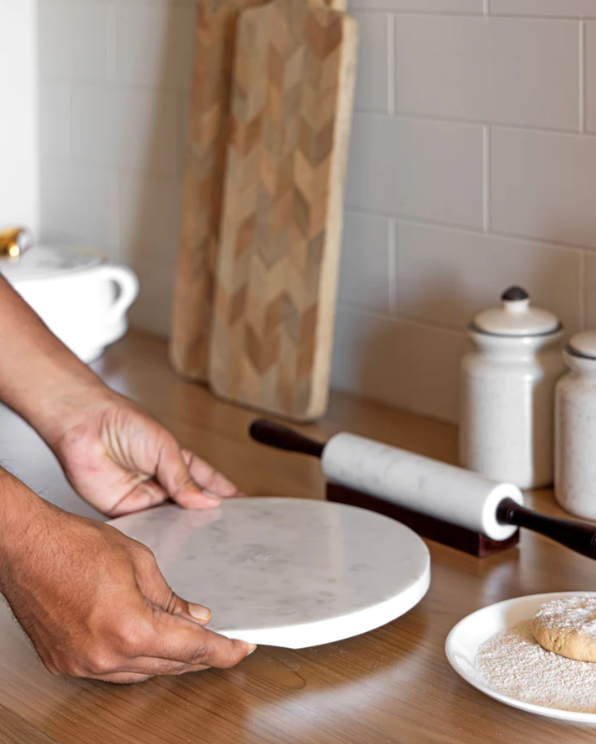Top Benefits of Using a Marble Rolling Pin Over Wooden or Steel Ones

Top Benefits of Using a Marble Rolling Pin Over Wooden or Steel Ones
When it comes to baking and cooking, the right tools can make all the difference. While traditional rolling pins made of wood or steel have been widely used for generations, modern kitchens are embracing a more elegant and practical option — the Marble Rolling Pin. Its natural weight, smooth surface, and ability to stay cool give it a unique edge over other materials. For home bakers and professional chefs alike, choosing marble over wood or steel brings a blend of style, precision, and performance.
Why Choose Marble Over Traditional Materials?
Wooden and steel rolling pins each have their own advantages, but they also come with limitations. Wood absorbs odors and moisture, making it prone to warping or cracking over time. Steel, while durable, tends to heat up quickly and stick to certain dough types. In contrast, a Marble Rolling Pin offers a perfect balance — it’s naturally heavy, non-porous, and resistant to temperature changes, making it ideal for delicate doughs and versatile baking tasks.
1. Superior Weight and Pressure Distribution
One of the biggest advantages of a marble pin is its natural heft. Unlike wooden pins that require added pressure from your arms, marble uses its own weight to flatten dough effortlessly. This feature ensures even rolling with less effort, reducing strain on wrists and shoulders. Whether you’re working with pie crusts, cookie dough, or pizza bases, the even distribution of pressure makes your baking process smoother and more efficient.
2. Naturally Cool Surface for Perfect Dough
Another standout benefit of the Marble Rolling Pin is its ability to remain cool, even in warm kitchens. This is particularly important for bakers who work with butter-based doughs such as puff pastry or croissants. Warm surfaces can melt butter too quickly, ruining the dough’s texture. Marble prevents this problem by keeping the dough firm, helping maintain the flaky layers and consistency that professional baking demands.
3. Non-Porous and Hygienic
Wooden rolling pins are often criticized for absorbing odors, oils, and moisture from food, which can lead to bacterial growth or lingering smells. Marble, on the other hand, is non-porous, meaning it does not absorb any food particles or liquids. The Marble Rolling Pin is easy to clean with just a damp cloth, ensuring a more hygienic and long-lasting tool for your kitchen. Its smooth surface also prevents dough from sticking, reducing the need for excess flour and keeping your recipes precise.
4. Elegant Aesthetic Appeal
Beyond functionality, marble adds a touch of sophistication to your kitchen. Its sleek finish and natural patterns make it more than just a tool—it’s a piece of decor. Many bakers enjoy displaying their marble pin on countertops or open shelves because it looks luxurious and timeless. Unlike plain wooden or steel pins, a marble option complements both modern and traditional kitchen styles.
5. Durability That Lasts Generations
Durability is another factor where marble stands out. While wood may warp or crack with moisture exposure and steel may dent or rust, marble retains its quality for decades with proper care. Investing in a marble pin means having a kitchen tool that doesn’t just serve you well today but also becomes a lasting part of your baking essentials.
6. Versatility in Culinary Use
The Marble Rolling Pin isn’t limited to baking. Its heavy, cool surface makes it excellent for rolling pasta dough, flattening tortillas, or even crushing spices and nuts. Unlike lightweight alternatives, the weight of marble ensures better results across different cooking tasks. This versatility makes it a multifunctional tool for everyday kitchen use.
7. Reduced Effort, Enhanced Results
With its weight and smoothness, marble takes much of the hard work out of rolling. Bakers often find they spend less time and energy flattening dough, which translates into more consistent results. The ability to roll dough evenly without repeated pressure saves time and ensures a professional finish, whether you’re preparing pies for family gatherings or pastries for a party.
8. Easy Maintenance and Care
Unlike wood, which requires regular oiling to prevent drying or cracking, marble is low-maintenance. It does not absorb food particles, so cleaning is quick and simple. A gentle wipe with a damp cloth keeps it spotless, and occasional polishing can maintain its shine. This makes marble not only practical but also hassle-free for busy kitchens.
9. Resistant to Temperature Fluctuations
Kitchens can get hot, especially when baking multiple dishes at once. Wooden rolling pins are highly sensitive to humidity and heat, while steel can become uncomfortably warm to handle. Marble remains unaffected by these changes, retaining its cool surface and structure. This resistance ensures consistent performance regardless of the environment.
10. A Long-Term Investment
For anyone serious about baking or cooking, a Marble Rolling Pin is more than just a utensil—it’s an investment. Its durability, style, and ease of use ensure that it continues to add value to your kitchen over the years. When compared to repeatedly replacing warped wooden pins or dented steel ones, marble proves to be the more cost-effective choice in the long run.
Final Thoughts
Choosing the right rolling pin can elevate your baking experience, and marble offers unmatched advantages. From its natural coolness and non-porous surface to its durability and aesthetic appeal, marble combines beauty with practicality in ways that wooden and steel rolling pins simply can’t. If you’re looking for a long-lasting, stylish, and high-performing tool, marble is the clear winner.
- AI
- Vitamins
- Health
- Admin/office jobs
- News
- Art
- Causes
- Crafts
- Dance
- Drinks
- Film
- Fitness
- Food
- Giochi
- Gardening
- Health
- Home
- Literature
- Music
- Networking
- Altre informazioni
- Party
- Religion
- Shopping
- Sports
- Theater
- Wellness


